- Center on Health Equity & Access
- Clinical
- Health Care Cost
- Health Care Delivery
- Insurance
- Policy
- Technology
- Value-Based Care
Dupilumab Reduces Asthma Symptoms Regardless of Exacerbation History, Study Finds
Dupilumab significantly reduced the risk of exacerbations compared with placebo in children with moderate to severe asthma, regardless of exacerbation history.
Dupilumab was shown to consistently reduce the risk of serious asthma exacerbations, improve lung function, and reduce Asthma Control Questionnaire 7 Interviewer-Administered (ACQ-7-IA) score, regardless of exacerbation history.

This post hoc analysis of the phase 3 VOYAGE study (NCT02948959) is published in Journal of Asthma and Allergy.
“As higher numbers of prior exacerbations are associated with a greater risk of future exacerbations, our findings suggest that dupilumab is efficacious in reducing risk of exacerbations even among patients with the highest number of prior exacerbations analyzed, who tend to be at the greatest risk of future exacerbations,” wrote the researchers of the study.
The analysis included patients who participated in VOYAGE and had a type 2 inflammatory asthma phenotype at study baseline. Patients were categorized into 15 subgroups, including 3 according to the number of exacerbations experienced in the year prior to the study, as well level of fractional exhaled nitric oxide (FeNO) or blood eosinophil count at baseline.
Efficacy end points were the annualized rate of severe exacerbations at the end of the 52-week treatment period, the proportion of children without exacerbations, and change in lung function parameters from baseline, which included ACQ-7-IA scores, percent predicted forced expiratory volume per 1 second (ppFEV1), and pre- and postbronchodilator (BD) FEV1/forced vital capacity (FEV1/FVC).
A total of 408 participants underwent randomization in VOYAGE, in which 350 patients with type 2 inflammatory asthma were included in the post hoc analysis. Of these patients, 236 were randomized to receive dupilumab and 114 to receive placebo.
In total, 132 patients had experienced 1 prior exacerbation, 107 patients had 2 prior exacerbations, and 111 had 3 or more exacerbations.
At baseline, there were no major differences observed in demographic or disease characteristics between treatment arms, except for the mean (SD) concentration of total allergen-specific immunoglobulin E, which tended to be lower in the placebo group in patients with 1 or 2 prior exacerbations and higher in those with 3 or more exacerbations.
The exacerbation risk was reduced by 78.9% in patients with 1 prior exacerbation, 62.7% in patients with 2 prior exacerbations, and 55.6% in patients with 3 or more prior exacerbations among patients who received dupilumab.
Additionally, dupilumab showed significant improvement in post-BD ppFEV1 in all patients with prior exacerbations, reaching significance for patients with FeNO of 20 ppb or more and 1 prior exacerbation (7.59%; 95% CI, 1.38%-13.29%; P = .0173). Dupilumab also improved pre-BD FEV1/FVC ratio across most groups, ranging from 2.59% to 6.42% change from baseline. Furthermore, numerically greater benefits were observed with increasing number of prior exacerbations, with significant improvements in asthma control observed in groups of patients with 3 or more prior exacerbations, regardless of baseline type 2 biomarker levels.
However, 106 (85.5%) patients in the dupilumab group and 35 (74.5%) patients in the placebo reported at least 1 treatment-emergent adverse event. Overall, dupilumab demonstrated an acceptable safety profile.
The researchers acknowledged some limitations to their study, such as it being a post hoc analysis, there being a small sample size of some groups, and that the etiology of the exacerbations in this analysis was unknown.
Despite these limitations, “in pediatric patients with uncontrolled, moderate to severe asthma with a type 2 phenotype, dupilumab consistently reduced the risk of asthma exacerbations, improved lung function (pre-BD ppFEV1 and pre-BD FEV1/FVC ratio), and reduced ACQ-7-IA scores, regardless of exacerbation history,” wrote the researchers.
Reference
Guilbert TW, Tolcachier A, Fiocchi AG, et al. Impact of exacerbation history on dupilumab efficacy in children with uncontrolled moderate-to-severe asthma: LIBERTY ASTHMA VOYAGE Study. J Asthma Allergy. 2024;17:143-159. doi:10.2147/JAA.S416292
